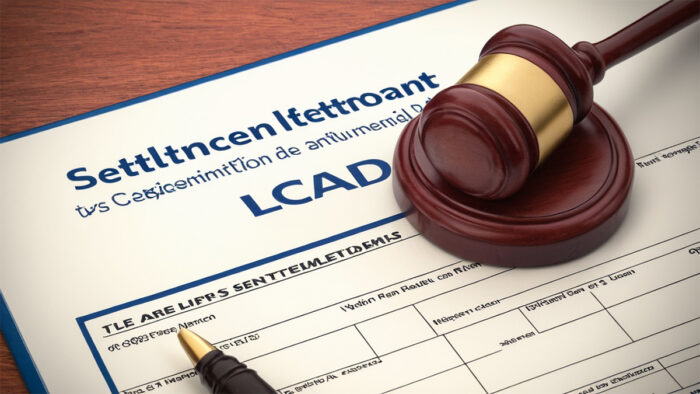A lawsuit settlement loan is a type of loan that offers cash in advance to applicants for lawsuit judgments and pending settlements. If you are looking to get class-action payments, then I suggest you get a lawsuit settlement loan.

Besides, it is an easy and fast solution to your financial problems. So, after you apply and get approved, you can pay back the loan as soon as the settlement has been paid out.
However, the interest rates will rise while the loan is still ongoing and unpaid. In addition to this, if you find a company that offers advanced funding services, you can arrange for one and settle your lawsuit.
Furthermore, an advance funding arrangement involves securing an interest as the funding entity tolerates the risk that the final award might be less than initially expected. Additionally, commercials for settlement loans and advance funding are recent and have a bad regulatory record.
How Does a Lawsuit Settlement Loan Work?
To obtain a settlement loan, one must secure a loan immediately to initiate a qualified lawsuit. The settlement loan provider assesses the benefits of your case, evaluates the probability of winning the lawsuit or reaching a settlement, and determines the anticipated compensation.
However, it’s important to know that companies providing settlement loans are driven by profit motives rather than goodwill. Their provision of lawsuit advances is a business endeavor aimed at making money.
In addition, they charge interest and fees, which you are obligated to settle in any eventual lawsuit settlement. Typically, payments are not required until your case concludes or you receive a judgment.
Some expenses, such as attorney fees and litigation costs, are settled first. Later, the loan company is reimbursed from the remaining funds.
Types of Lawsuit Settlement Loans
Lawsuit funding extends its coverage to a broad range of events, offering the option to secure car accident lawsuit loans with payouts. In addition, it depends on the significant value of your future settlement to determine coverage for medical expenses and other financial needs.
Meanwhile, car crash loans are the most common, and legal funding is also accessible for various situations, including:
- Workers’ compensation and negligence
- Cases involving defective products or drugs
- Slip-and-fall lawsuit loans
- Premises negligence
- Lawsuits related to police brutality
- Incidents involving commercial truck accidents
- Claims pertaining to employment and labor law violations
- Whistleblower and Qui Tam complaints
- Cases involving defective medical devices
- Wrongful arrests
Your attorney, considering the challenges of your case, will assist you in selecting the most suitable loan terms and conditions tailored to your specific needs.
Advantages and Disadvantages of a Lawsuit Settlement Loan
Similar to many loans, lawsuit settlement loans come with both advantages and disadvantages. It is crucial to carefully consider these factors before determining if this type of loan aligns with your needs.
Advantages
- Swift and straightforward access to funds
- No credit check is necessary.
- Deferred payments until your case is resolved
- The funds can be utilized for a diverse range of expenses.
Disadvantages
- Elevated interest rates, varying by lender
- Accumulation of fees and charges
- Lack of federal regulation
Lastly, there are alternatives, such as borrowing from a 401(k) or from families, which are frequently more favorable choices for requiring immediate cash.
Who Needs a Lawsuit Settlement Loan?
If you have suffered a personal injury, like an accident or medical malpractice, the duration of filing a case and receiving a settlement is months or even years. During this period, an inability to work may lead to a loss of income.
However, financial support from a lawsuit loan can serve as a lifeline during this phase. Additionally, if medical expenses and living costs continue to increase, a lawsuit settlement loan may appear as a relief in a financial desert.
Moreover, it’s essential to crucially evaluate all available alternatives before committing to such an arrangement.
How Long Does It Take to Get Lawsuit Settlement Loans?
The process of obtaining a lawsuit loan can be very quick. Upon reaching out to a High-Rise Financial representative, you can immediately start the application process.
Typically, applications are either accepted or rejected within a span of 24 to 48 hours. In the event of a successful application, you may access cash for your lawsuit loan in as little as 24 hours.
What Can a Lawsuit Settlement Loan Be Used For?
If you are a victim of an accident or medical malpractice, it’s possible that you might find yourself unable to work. This leads to potential difficulties in keeping up with your payments.
A settlement loan provides you with the funds to manage your living costs and payments before a judgment is rendered or the case reaches a settlement. This cash can be utilized to cover various essentials. This includes rent or mortgage payments, car expenses, medical bills, or even groceries.
How Much Can I Borrow With a Lawsuit Settlement Loan?
The sum you can borrow through a lawsuit settlement loan is determined by the settlement amount and the merits of your case. Lenders typically extend a loan equivalent to a percentage of the estimated total settlement, commonly falling within the range of 10–20%.
How is a Lawsuit Settlement Loan Different From Advance Funding?
Lenders offering lawsuit loans typically assess a borrower’s credit. They also consider the chance of a settlement or lawsuit recovery before granting a loan. Additionally, companies offering advance funding often do not assess the credit but depend on an analysis of the expected recovery.
This often makes it more accessible to secure advance funding arrangements, especially for individuals with a minimal credit rate. As for a lawsuit settlement loan, the borrower is required to pay back the borrowed amount along with interest for the duration of the loan.
However, in an advance funding arrangement, the rate of the award that will be granted to the funder is determined from the beginning. The litigant entering into an advance funding agreement typically bears no personal liability.
If the lawsuit is lost or the award isn’t enough to meet the funder’s expectations, the financial loss is borne by the funder, not the litigant. Also, the terms and conditions may vary, but both types of arrangements can significantly reduce a plaintiff’s recovery.
Conclusion
Settlement loans can offer financial support when waiting for a lawsuit settlement to cover essential expenses. However, they often come at a high cost. Interest rates are commonly high. And if your lawsuit extends over an extended period, you may find yourself dealing with years of increasing interest.



